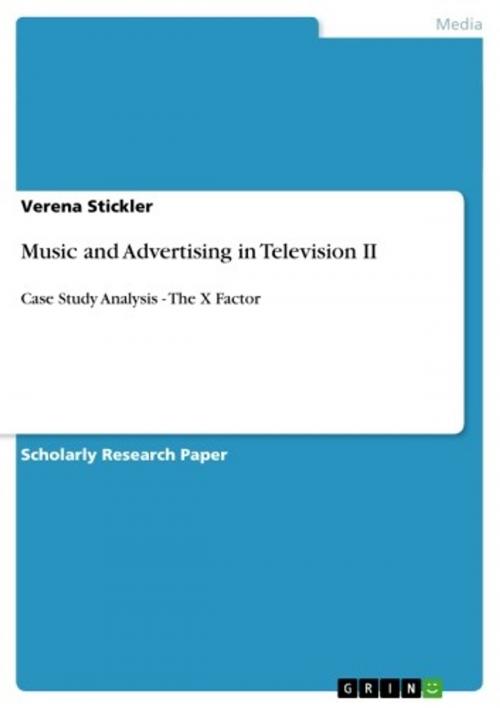Music and Advertising in Television II
Case Study Analysis - The X Factor
Nonfiction, Entertainment, Performing Arts, Film| Author: | Verena Stickler | ISBN: | 9783640998234 |
| Publisher: | GRIN Verlag | Publication: | September 2, 2011 |
| Imprint: | GRIN Verlag | Language: | English |
| Author: | Verena Stickler |
| ISBN: | 9783640998234 |
| Publisher: | GRIN Verlag |
| Publication: | September 2, 2011 |
| Imprint: | GRIN Verlag |
| Language: | English |
Research Paper (undergraduate) from the year 2008 in the subject Communications - Movies and Television, grade: 1,1, London Metropolitan University (London Metropolitan University), language: English, abstract: 'The X Factor' is a reality pop program which first aired in the UK in September 2004 and which is still on screens today. The history of the sector is multi-faceted with the very first reality pop series, New Zealand's 'Popstars', dating back to 1999. 'The X Factor' emerged after 'Pop Idol', a similar show to 'Popstars', was put on indefinite hiatus after its second run. Ever since its first series, 'The X Factor' has gone from strength to strength, with audience and voting figures increasing with each series. The single most important person behind 'The X Factor' is music mogul Simon Cowell who created the show back in 2004. His television company SyCo TV produces the program together with Fremantle Media's talkbackTHAMES. 'The X Factor' is aimed at reality TV's target demographic and manages to attract an audience of approximately 8-9m during its weekly live broadcasts. As the reality genre has proven particularly amenable to TV and media convergence, 'The X Factor' does not just rely on the television set to communicate its message to its audiences. It also relies on other 'platforms', like the internet, live events and telephone voting, hence altering popular music consumption. With the audience determining the winner of 'The X Factor' several albums released by contestants have reached the UK Albums Chart; six of them making it to number one. 'The X Factor' is often heavily criticized for standardizing pop music. Winners of 'The X Factor' are often referred to as over-hyped and over-manufactured artists with reality pop programs being accused of not producing important or lasting musicians. However the commercial success of 'The X Factor' is indisputable, which as a result, continues to encourage the production of further X Factor series as well as similar shows to go on.
Research Paper (undergraduate) from the year 2008 in the subject Communications - Movies and Television, grade: 1,1, London Metropolitan University (London Metropolitan University), language: English, abstract: 'The X Factor' is a reality pop program which first aired in the UK in September 2004 and which is still on screens today. The history of the sector is multi-faceted with the very first reality pop series, New Zealand's 'Popstars', dating back to 1999. 'The X Factor' emerged after 'Pop Idol', a similar show to 'Popstars', was put on indefinite hiatus after its second run. Ever since its first series, 'The X Factor' has gone from strength to strength, with audience and voting figures increasing with each series. The single most important person behind 'The X Factor' is music mogul Simon Cowell who created the show back in 2004. His television company SyCo TV produces the program together with Fremantle Media's talkbackTHAMES. 'The X Factor' is aimed at reality TV's target demographic and manages to attract an audience of approximately 8-9m during its weekly live broadcasts. As the reality genre has proven particularly amenable to TV and media convergence, 'The X Factor' does not just rely on the television set to communicate its message to its audiences. It also relies on other 'platforms', like the internet, live events and telephone voting, hence altering popular music consumption. With the audience determining the winner of 'The X Factor' several albums released by contestants have reached the UK Albums Chart; six of them making it to number one. 'The X Factor' is often heavily criticized for standardizing pop music. Winners of 'The X Factor' are often referred to as over-hyped and over-manufactured artists with reality pop programs being accused of not producing important or lasting musicians. However the commercial success of 'The X Factor' is indisputable, which as a result, continues to encourage the production of further X Factor series as well as similar shows to go on.















